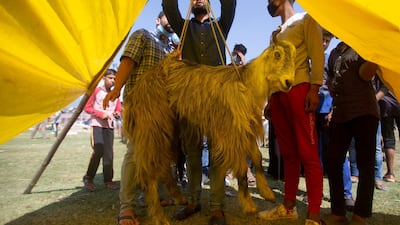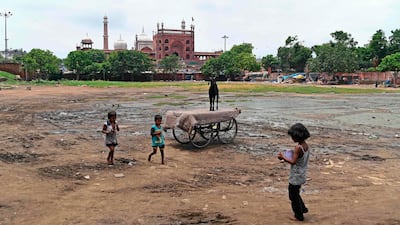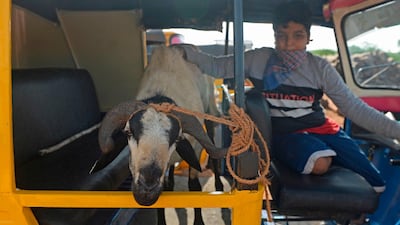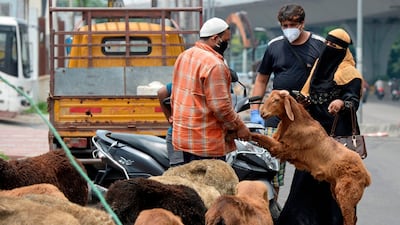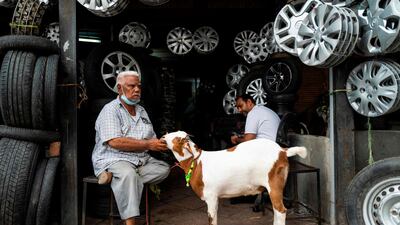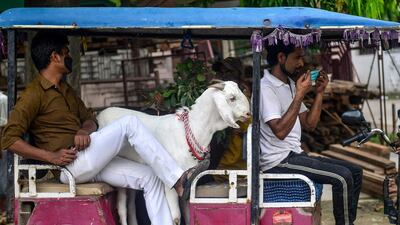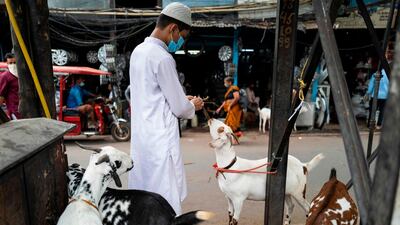When Faisal Nadeem found out that the Mumbai market he visits each year to buy goats for Eid Al Adha was closed because of the coronavirus pandemic, he worried that he would not be able to perform the sacrifice that is central to the festival.
But the IT professional then discovered that he could buy goats online, and he purchased two animals last week, which were delivered to his doorstep.
“We saw the photos and selected the goats,” Mr Nadeem said. “They delivered the exact goats that I picked out. It was easy. We paid once we got delivery.”
With India's confirmed coronavirus cases already past 1.5 million and climbing daily, authorities have either closed or placed restrictions on markets that normally sell millions of goats, sheep and cattle for slaughter during Eid Al Adha because of concerns about the virus spreading in crowded places.
In Maharashtra, of which Mumbai is the capital, the state government ordered that animals for slaughter could only be bought online
This resulted in a lot of confusion among both customers and the traders selling the livestock.
Some Muslims have expressed concerns that, without physical inspection, the animals they bought online could be “defective” or unhealthy, which would make them unsuitable for sacrifice.
_______________
Eid preparations around the world
_______________
Another obstacle is that many of the farmers and traders selling the animals are illiterate, or at least not computer savvy, which makes the transition to online sales difficult for them.
“This year it's a big loss. The farmers are not clear about the rules we have to follow,” said Munendra Singh, a goat farmer based near the capital, New Delhi.
He said he knew of farmers whose goats were stuck on the border of Maharashtra. The animals had been ordered by buyers in the state but the trucks carrying them were not being allowed to enter.
“The goats are dying because they don't have food and water, and they're suffocating in the trucks,” Mr Singh said.
MJ Khan, chairman of the Indian Chamber of Food and Agriculture based in New Delhi, said farmers had already been badly affected by the coronavirus pandemic and lockdowns, and the restrictions were affecting them at a peak time for livestock sales.
“This is the time that they used to make a lot of profits, and whatever losses they had during the year, they would recover the losses during the Eid time,” said Mr Khan, who is also president of the Indian Muslims for Progress and Reforms association.
Another challenge for the online sale of livestock is delivery – because of restrictions on movement in some states – and a lack of labour as many workers have returned to their home villages.
“Even if there are buyers, there are logistical issues,” Mr Khan said.
He said the economic loss for farmers would be enormous, and he had been lobbying state governments to relax their restrictions but to no avail.
“The consumers are not going to get goat meat in time, he said, adding that "the people who believe that sacrificing a goat on the day of Eid is a duty for those who can afford it might miss out on that”.
Mr Khan said farmers were resorting to selling off the animals and their meat locally, but at lower prices that are affordable to the rural population.
Some have turned to WhatsApp and video conferencing software to facilitate the sale of animals.
In Uttar Pradesh in north India, five alumni of the state's Aligarh Muslim University launched the website netlivestock.com earlier this month to help farmers sell goats.
Syed Hasan, one of the site's founders, said they started out by approaching local farmers and uploading information and photos of their animals on their behalf.
“We're doing this on a no-profit basis,” he said.
Following coverage in the Indian media, the team started to get requests from farmer in other states to have their livestock posted on the website, Mr Hasan said. So far, more than 100 farmers have signed up to the website and more than 350 animals have been sold.
The most expensive goat on the website was priced at 100,000 rupees (Dh4,913) and weighs 120 kilos. The prices of some goats were reduced as Eid drew closer.
In Mumbai, Mr Nadeem used an online marketplace set up by a local supplier. He said the price he paid for the two goats, 41,700 rupees, was attractive.
However, many people cannot afford to buy animals for sacrifice this year after millions lost their jobs as a result of lockdowns and with many businesses still closed as the virus continues to spread rapidly through the country of 1.3 billion people.
“Due to the coronavirus pandemic a lot of people are in financial crisis and they have not purchased goats,” Mr Nadeem said.
